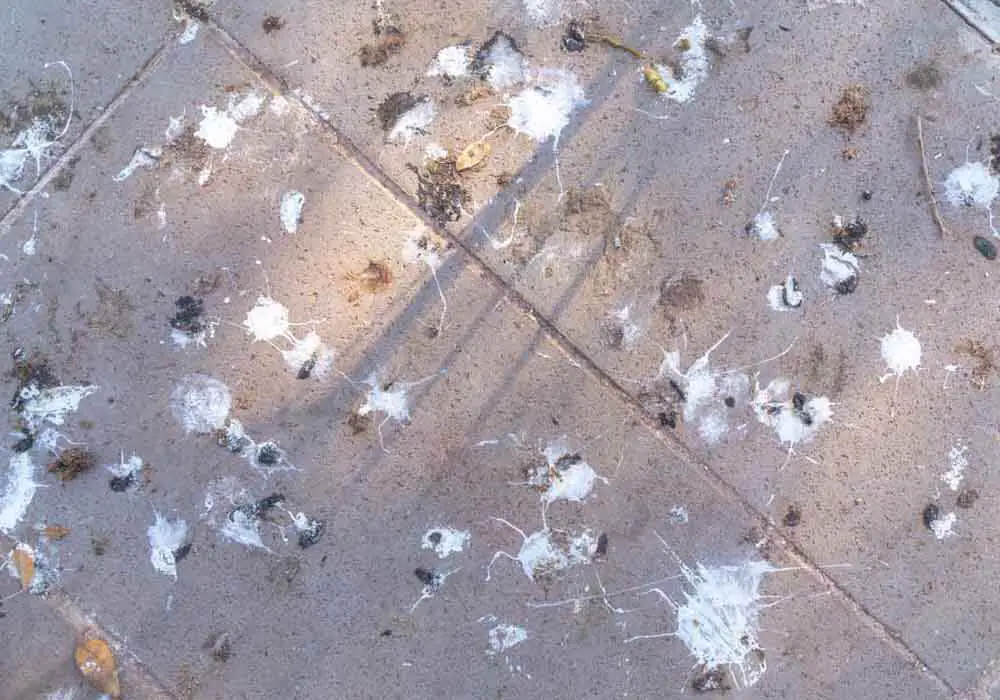Facts About Bird Poop
Most Everything You Ever Wanted To Know
...And Things You Didn't
Birds are one of the most fascinating species to grace the face of the earth, and sometimes, even their less gracious bodily processes raise the curiosity of many. Given that these warm-blooded vertebrates are avians, not mammals, it can sometimes be hard for us to wrap our heads around what a normal waste excretion process looks like for them. So, what are some interesting facts about bird poop?
There's no shortage of interesting facts related to bird poop. For example, birds lack anal sphincters, which is why they often defecate even while flying. Moreover, because these animals don't have different exits for urine and feces, they usually eliminate both waste products simultaneously.
In the rest of this article, I'll take you through nine fascinating facts about bird poop, giving you some more insight into the workings of these creatures' digestive systems. So, make sure to keep reading to learn more about why birds defecate while flying, how their feces get their distinct white coloring, and what a regular bathroom schedule looks like for these winged animals.

9 Informative Facts About Bird Poop
While most birds share a similar anatomy, some of these facts don’t apply to all species of birds, which is important to mention right off the bat. As you’ll learn by reading through the following sections, different species sometimes have unique habits and behaviors. Owls and seagulls, for example, don’t behave the same as the rest of their avian cousins and, therefore, have slightly differing bathroom habits.
For example, owls poop in two ways. While the first way resembles what you’ll read about in the following sections, the second approach is through the regurgitation of undigested food in the form of pellets. That being said, most winged birds all poop the same way. (That’s a bonus fact for you!) So, without further ado, let’s look at some of the most interesting bathroom habits of birds.
Do Birds Poop While Flying?
Birds can poop while flying because they don’t have an anal sphincter like humans. That means that birds can poop pretty much whenever since they don’t have a sphincter to hold it in and, thus, possess little control over their bathroom habits.
However, most birds don’t poop during flight because of how they fly– with their feet tucked beneath them. Most animals, winged or not, will avoid their waste once it has been released, so pooping all over their own feet is less than ideal. Either way, it clearly is possible for birds to defecate in the air.
Do Birds Pee and Poop at the Same Time?
Most birds pee and poop at the same time; both urine and excrement are released together. However, bird pee differs significantly from that of humans. Bird urine is actually called uric acid, and it exists as the white liquid excrement that you’re familiar with.
So when it comes to facts about bird poop, believe it or not, most birds pee while they poop and poop while they pee! Weird, huh? Again, since birds don’t have control over when they “use the bathroom” (due to the lack of a sphincter), all of their bodily waste is uncontrollably released at the same time!

Since you're interested in reading about bird poop we also thought you might be interested in this other article of ours about the ways that birds die.
Do Birds Pee and Poop From the Same Hole?
Birds pee and poop from the same hole. This hole is called the cloaca. The presence of a bird’s cloaca also explains why they pee and poop simultaneously. This outlet is also responsible for bird’s reproduction.
In fact, the white bird poop you see sometimes staining the sidewalk is a mixture of uric acid (bird pee) and excrement. The excrement is the dark substance usually in the center of the waste, while the white part of bird poop is the uric acid! Next time you see some white bird droppings, share with your friends that it’s actually bird pee.
It’s worth it to note, as well, that while birds use the same hole for both excretions, poop and pee come from different areas inside the bird’s body, particularly the urethra and the intestines. Birds simply didn’t evolve to have seperate excretion holes.
Do Birds Intentionally Poop on Cars?
Birds don’t intentionally poop on cars. Since birds have no anal sphincters, they aren’t able to control when and where they excrete. However, since most of the droppings fall either on the ground or on top of our cars, we’re more likely to notice when the latter occurs.

While I’d like to say that birds intentionally choose which cars to poop on (based on how much they like the owner), the fact of the matter is that birds don’t intentionally poop on vehicles. Still, there are a few explanations as to why you may find bird poop on your windshield.
For the most part, birds drop a load on your car for one of two reasons:
- Your car is parked underneath their nest (beneath a tree, for example), and it’s simply a case of wrong-place-wrong-time or;
- The bird sees its reflection in your car and also has a terrible startle reflex.
In all seriousness, there isn’t much information out there regarding why birds might unload on your vehicle. However, there have been a number of claims that state birds are attracted to certain colors (specifically red, blue, and green). As a result, they are found more often near cars of that color and end up getting lots of bird poop on them.
Some people have also said birds poop when stressed or frightened, although I have never once seen a seagull poop as a fear response (have you ever seen a child run wildly at a group of seagulls?)
In reality, the most common cause of your car being covered with bird poop is that you’ve parked it beneath a nest in a tree or under bird resting on a branch.
If that’s not the case, consider whether you’re parking beneath telephone lines or light posts. Parking beneath either of those may result in a perched bird letting one go on the hood of your car. Birds will nest and perch in high places to get a better view of their surroundings, so if you’ve chosen to park beneath one, let’s hope you’ve got a cleaner on-hand! facts about bird poop
Did you realize that bird poop changed the world?
Watch this YouTube video
that will give you all the poop!...errr scoop!
What Is Bird Poop Good For?
Bird poop can be good to use as a makeshift fertilizer. The droppings are able to deliver nutrients to underwater environments. Similarly, bird feces can help create an excellent compost mix.
According to the National Museum Of American History, bird poop is an excellent plant fertilizer and a great ingredient for compost. It helps many plants grow stronger and quicker when added to the soil. It’s such a good fertilizer, in fact, that Americans used to mine (and fight) for it in the 1800s!
At the same time, bird poop has nutrients in it that get delivered to the oceanic ecosystems (when birds drop their feces on the water’s surface). Guano contains nitrogen and phosphorus (hence why they make great fertilizer), and those nutrients get consumed by coral reefs, contributing to their extended lifespan.
At the same time, studies have shown that the ammonia in guano can actually affect global warming, maintaining the world at a relatively cool temperature when guano collects en masse! So, bird poop is actually one of the world’s natural climate change activists. Who knew bird poop could be so valuable?
How Many Times Do Birds Poop a Day?
Are you ready for the answer? Truly? Because I did a double take when I learned this bird poop fact.
Birds generally poop anywhere from twenty-five to fifty times a day. They defecate often because of their high metabolism rate and the ability to process food very quickly.
Again, not all birds are the same– we learn this in grade school, people– but even twenty-five bathroom breaks a day would be downright unconstitutional at my day job.
Some birds poop more than others. For example, lovebirds might poop on the higher side of that scale (fifty poops a day), but macaws are on the lower end of the poop quantity spectrum, at twenty to twenty-five poops a day. Naturally, this is due to their consumption and digestion habits, which differ depending on the species.
Based on how species of birds consume their food, the bathroom habits of birds differ, as well. Like I mentioned earlier, owls poop out guano but also regurgitate anything that can’t be digested (that would typically have been released in their guano if it could be digested). Owls may only regurgitate pellets once or twice a day, but they excrete guano much more regularly.
When I think about it, my family used to own a canary bird named Coco who constantly left droppings all over the bottom of his cage that I begrudgingly had to clean. In just one day, Coco’s cage would be littered with at least fifteen droppings, and he was a very small bird.
What the bird consumes and how often will dictate how often the bird will use the world as their bathroom.
How Toxic Is Bird Poop?
Bird poop isn’t very toxic, but it can be in some cases. According to NYC Health, breathing in certain fungi in bird poop can lead to several human diseases such as cryptococcosis, histoplasmosis, and psittacosis. The fungi travels in the form of dust from dried guano.
Cryptococcosis is a fungal infection that can show up in one’s lungs or brain. In the lungs, the condition presents with symptoms similar to pneumonia (shortness of breath, coughing, chest pain) and in the brain as meningitis. These diseases can be particularly fatal if left untreated.
Histoplasmosis is an infection that appears and disappears naturally. However, there are cases where it has caused further infection in the lungs, and results in coughing, shortness of breath, and fever. Psittacosis is another infection that can travel to the lungs. All three infections have very similar symptoms. Luckily, they are also all relatively treatable and quite rare.
The fungi are present in the particles of guano that one breathes, most often during the cleaning process. If you suspect you may be sick as a result of recently cleaning bird poop, it would be wise to go to the nearest doctor for inspection.
In short, while bird poop isn’t generally toxic, being exposed to significant amounts for an extended period of time can lead to some health-related issues.
Here's another history making fact pertaining to bird poop!
Is there anything that it can't do??
What Is Bird Poop Called?
Bird poop has several names. Some of them are bird droppings, bird excrement, bird feces, or guano. Technically, guano is specific to sea birds (birds that hunt for food in water) or bats, but most understand the term to refer to the white droppings they regularly see made by pigeons and seagulls.
The term ‘guano’ was first introduced to me in the movie Ace Ventura Pet Detective. If you haven’t seen it, you probably should, but that’s beside the point. Without making this post about the best pet movie of all time (the second movie being primarily about bats), the main character learns through a series of unfortunate yet amusing events that guano is the Indigenous Spanish-Quechua word for bat poop.
Why Is Bird Poop White?
Bird poop is white because it contains uric acid and guanine. Both of these are produced by the bird through food consumption and digestion.
Uric acid is white, and as you’ll recall, most of the white bird poop that we occasionally have to scrub off our cars angrily is actually bird pee– uric acid!
If you take a good look at bird poop, in fact, you’ll notice that it’s primarily white with a dark or black center. The dark center is the accumulation of guanine (the actual bird poop), while the white paste is the bird’s uric acid (their urine).
Facts About Bird Poop...Final Thoughts
In conclusion, birds and bird poop can be a fascinating topic if you’re interested in bird anatomy, the chemical composition of guano, or general bird-pooping behavior. By the end of this read, you should have a better grasp of everything related to this weirdly interesting topic, armed and ready with knowledge to share with your peers or teachers!
Back To The TOP Of This Facts About Bird Poop Page

About the Author...
Richard Worden, a dedicated bird lover for over 20 years, I love to share my in-depth knowledge and passion for birds. Read more About Me and my expertise in this field.
- We Know Birds HOME ›
- Bird Facts and Information ›
- Facts About Bird Poop
